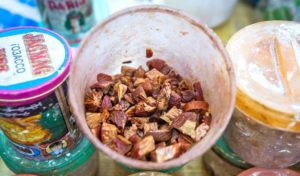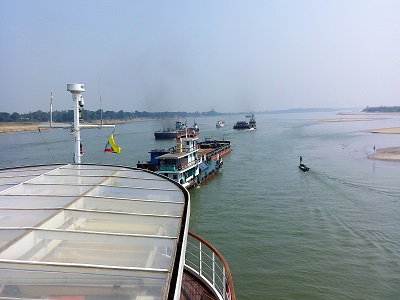
Myanmar is facing a glut of areca, or betel nuts in border trading areas near India due to an influx of the product from Indonesia even as the Indian government continues to limit the import of agricultural goods from Myanmar, traders say.
Areca nuts were a major export to India via the Tamu border trading point in Sagaing Region, and the Rhi border trading point in Chin State, until India decided to close its border gates and crossings.
However, a year ago, India imposed a tariff of 40 percent on the product after it said areca nuts from Indonesia were entering the country via Myanmar. As part of efforts to control the inflow of the product, the Indian government also began closing border crossings.
Since last May, the Indian government banned vehicles from crossing the Myanmar-India border bridge in Rih Khaw Dar which is part of the Rih trading route in Chin State.
Meanwhile, the Tamu border trade station in Sagaing Region has been closed for nearly two months, bringing trade to a halt said traders there.
“The situation is very bad. Due to the large quantities of nuts from Indonesia, the prices of our Myanmar nuts fall and transaction drop. Myanmar traders have to buy and sell to each other instead of across the border. Profits have dropped drastically as the India side is closed and transactions have totally stopped,” said a nut merchant in the Tamu border area.
Source: Myanmar Times






 The government will temporarily stop issuing sugar re-export licenses in anticipation of the local sugar cane season, according to a senior official from the Ministry of Commerce. Issuing of re-export licenses will continue until September 22, after which the government would no longer issue re-export licenses, according to the Directorate of Trade under Ministry of Commerce. But sugar industry players said the September 22 cutoff date is already late as there is an existing glut in the market. Sugar warehouses in Yangon, Mandalay and Muse have abundant stocks of the commodity, with an estimated surplus of 300,000 tonnes. The current price of sugar has fell to K660,000 per tonne compared with the K850,000 per tonne before sugar imported from foreign countries through the re-export system flooded the local market.
The government will temporarily stop issuing sugar re-export licenses in anticipation of the local sugar cane season, according to a senior official from the Ministry of Commerce. Issuing of re-export licenses will continue until September 22, after which the government would no longer issue re-export licenses, according to the Directorate of Trade under Ministry of Commerce. But sugar industry players said the September 22 cutoff date is already late as there is an existing glut in the market. Sugar warehouses in Yangon, Mandalay and Muse have abundant stocks of the commodity, with an estimated surplus of 300,000 tonnes. The current price of sugar has fell to K660,000 per tonne compared with the K850,000 per tonne before sugar imported from foreign countries through the re-export system flooded the local market.